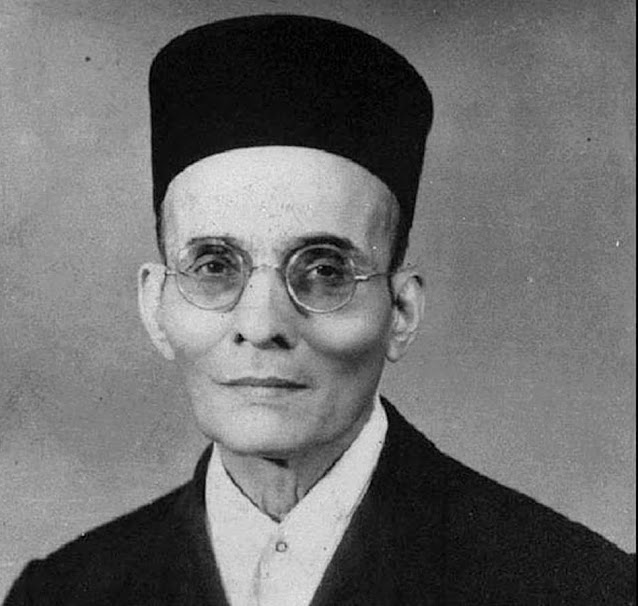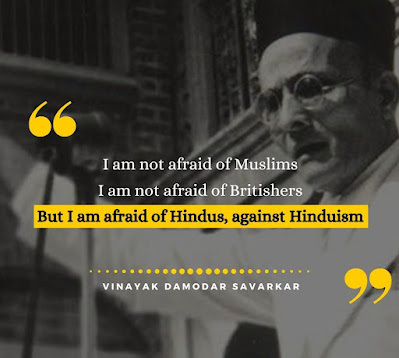Introduction: In the annals of Indian history, there are several figures who have left an indelible mark on the nation’s struggle for independence. While some names like Mahatma Gandhi, Jawaharlal Nehru, and Subhas Chandra Bose are widely recognized, there are heroes whose contributions have been overshadowed or forgotten over time. One such unsung hero is Vinayak Damodar Savarkar, affectionately known as Veer Savarkar. This blog aims to shed light on the life and legacy of this remarkable figure who played a pivotal role in India’s freedom movement. Yet many people blame him for his pardon letter to Britishers, which we will discuss later in this blog.

Early Life and Education:

Veer Savarkar was born on May 28, 1883, in the village of Bhagur in present-day Maharashtra, India. From an early age, he exhibited a keen intellect and a deep sense of patriotism. Savarkar was greatly influenced by the tales of valor and sacrifice from India’s history, which sparked a fire of nationalism within him. He excelled academically and went on to pursue higher education in Mumbai and London, where he became a barrister.
Activism and Nationalism:

Savarkar’s time in London exposed him to revolutionary ideas and revolutionary leaders. He became a prominent member of the India House, an organization formed by Indian students, which advocated for India’s independence from British rule. Savarkar’s book, “The First War of Indian Independence,” brought attention to the 1857 rebellion and the bravery of Indian revolutionaries.
In 1909, Savarkar faced the wrath of the British Raj when he was arrested for his involvement in the revolutionary activities against British rule. He was sentenced to two life terms totaling 50 years in the Cellular Jail in Andaman and Nicobar Islands. Despite the hardships and isolation, Savarkar’s spirit remained unbroken, and he continued his intellectual and ideological battle for India’s freedom.
Philosophy and Contributions:

Veer Savarkar’s contribution to the Indian freedom struggle extends beyond his revolutionary activities. He was a profound thinker and philosopher who introduced the concept of “Hindutva” to unite and strengthen the Hindu community. Hindutva, as espoused by Savarkar, emphasized cultural and national unity while recognizing the pluralistic nature of Indian society. His work laid the foundation for the Hindu nationalist movement in India.
Savarkar’s writings, including his book “Hindutva: Who is a Hindu?” and numerous articles, highlighted the importance of self-reliance, self-defense, and the preservation of Indian culture. He advocated for the abolishment of caste discrimination and worked tirelessly to promote social reforms within Hindu society.
Legacy and Recognition:
Despite his significant contributions to India’s independence movement, Veer Savarkar’s legacy has often been overlooked or distorted. He faced criticism and vilification from certain quarters due to his nationalist ideology and revolutionary activities. However, in recent years, there has been a growing acknowledgment of his contributions, and his name is being brought back to the forefront.
Many Indians today recognize Veer Savarkar as a visionary leader who fought for India’s independence and laid the ideological groundwork for a strong and united nation. Efforts are being made to preserve his memory, including the establishment of educational institutions and memorials in his honor.
Controversy:
- Alleged Involvement in the Assassination of Mahatma Gandhi: One of the most significant controversies surrounding Veer Savarkar is his alleged involvement in the conspiracy to assassinate Mahatma Gandhi. Though Savarkar was acquitted of any direct involvement by the courts, some critics argue that his writings and speeches promoting nationalism and violence may have influenced the assassins. However, it is important to note that there is no conclusive evidence linking Savarkar directly to the assassination.
- Hindutva and Communal Politics: Veer Savarkar is often associated with the concept of Hindutva, which some critics perceive as an exclusionary and divisive ideology. The term Hindutva, as interpreted by some, places emphasis on Hindu identity and has been used by right-wing Hindu nationalist groups to promote their political agenda. Critics argue that this ideology undermines India’s secular fabric and promotes religious polarization.
- Views on Social Issues: Savarkar’s views on social issues, including his stance on caste discrimination and religious conversions, have also been a subject of controversy. While he advocated for the abolition of caste discrimination and worked towards social reforms, some argue that his approach did not go far enough in addressing the deep-rooted social inequalities in Indian society. Additionally, his views on religious conversions have been criticized as being intolerant towards religious minorities.
It is important to recognize that opinions on Savarkar’s controversial aspects differ widely. While some view him as a patriot and visionary leader, others criticize certain aspects of his ideology and actions. The controversies surrounding him continue to generate discussions and debates among scholars, historians, and political commentators, shaping the ongoing discourse on India’s history and identity.
Conclusion:
Veer Savarkar’s life and work are a testament to his unwavering dedication to the cause of Indian independence. As we remember and honor the heroes who played pivotal roles in shaping our nation’s history, it is crucial not to overlook the contributions of individuals like Savarkar. His legacy serves as an inspiration for future generations to strive for freedom, justice, and the preservation of our cultural heritage. Veer Sav
